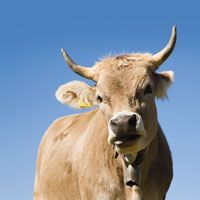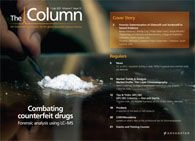PBDEs in pasture
In the first controlled study of PDBE concentrations looking at soil, grass and the milk of cows grazed on flood-prone land on industrial river catchments, it was found that even if the land itself becomes polluted these river sediments do not introduce an increased health risk in cow?s milk.

Polybrominated diphenyl ethers (PBDE) are used as flame-retardants and are widely distributed into the environment. In the first controlled study of PDBE concentrations looking at soil, grass and the milk of cows grazed on flood-prone land on industrial river catchments, it was found that even if the land itself becomes polluted these river sediments do not introduce an increased health risk in cow’s milk.1
Soil and grass were collected from the same areas of fields from five flood-prone farms on the River Trent, UK, and five neighbouring flood-free farms along with milk produced on the ten farms. Samples were analysed by GC–MS, which targeted 16 PBDE congeners. Higher PBDE levels were detected in soil on flood-prone compared with control farms; median 770 vs 280 ng/kg dry weight. However these higher levels were not reflected in the grass samples, which the study suggests indicates that PBDE contamination on soils is not transferred efficiently to grass. According to the study, this observation, and the fact that cows on flood-prone farms spend time on non-flood-prone land and eat a lot of commercial food, could explain why no significant difference was seen in flood-prone and control milks.
1. I.R. Lake et al., Environ. Sci. Technol., 45(11), 5017–5024 (2011).
This story originally appeared in The Column. Click here to view that issue.
HPLC 2025 Preview: Fundamentally Speaking (Part 1)
May 13th 2025Michael Lämmerhofer from the Institute of Pharmaceutical Sciences, University of Tübingen, Germany, spoke to JFK Huber Lecture Award winner of 2024 Torgny Fornstedt, professor in analytical chemistry and leader of the Fundamental Separation Science Group, Karlstad University, Sweden, about his pioneering work in high performance liquid chromatography (HPLC) with a focus on fundamentals and industrial applications.
Reversed-Phases for LC Deliberately Doped with Positive Charge: Tips and Tricks for Effective Use
May 13th 2025In this month's edition of LC Troubleshooting, Dwight Stoll and his fellow researchers discuss both the benefits (improved peak shape/loading) and challenges (excessive interaction) associated with charge-doped reversed-phase (RP) columns for both analytical and preparative separations.
Determining Ways to Protect Honeybee Colonies with GC–MS
May 13th 2025A study conducted by the Agriculture Research Centre of Giza, Egypt, and Jilin Agricultural University in China, evaluated the efficacy of stinging nettle extract, nettle smoke, and formic acid in the controlling of Varroa mites, a major threat to honeybee colonies, with a focus on mite infestation reduction, honeybee mortality, and biochemical responses. Gas chromatography–mass spectrometry (GC–MS) was used to identify key bioactive compounds in the stinging nettle extract.

.png&w=3840&q=75)

.png&w=3840&q=75)



.png&w=3840&q=75)



.png&w=3840&q=75)











